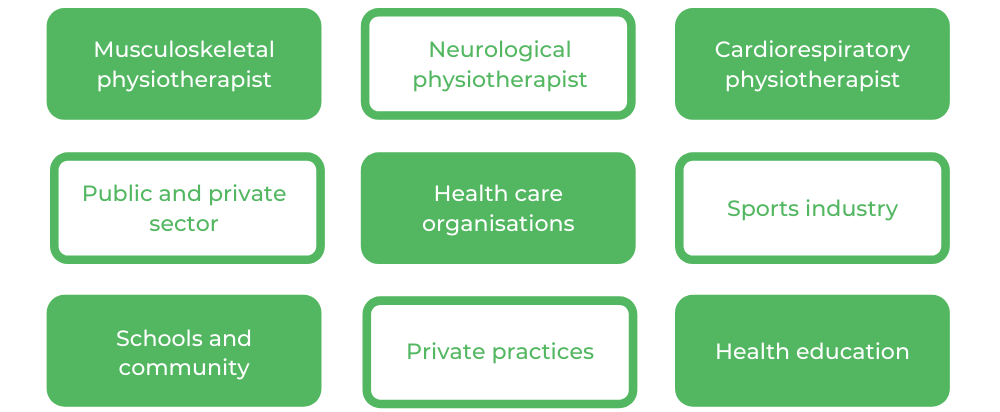Are you interested in studying Physiotherapy at USYD? Maybe you’re someone that has a lot of experience in sport, and wants to help others through an injury.
Either way, we’ve got everything you need to know about what it’s like studying a Bachelor of Applied Science (Physiotherapy) at USYD here! But for now, we’ve talked to Clement to find out about what he truly thinks of this degree.
So, let’s dive into the nitty gritty!
Why should you study a Physiotherapy degree at USYD?
Top 3 Pros of a Physiotherapy Degree
Top 3 Cons of a Physiotherapy Degree
Mistakes You Shouldn’t Make
Things to Know Before Starting USYD Physiotherapy
What Makes this Degree Different
Motivations for Studying USYD Physiotherapy
Potential Career Paths
Why should you study a Physiotherapy degree at USYD?
If you enjoy sport or helping people through injuries and rehabilitation, a future career as a physiotherapist might just be the role for you! Most people who study this degree want to become a physiotherapist, but it’s also a great pathway to other similar areas in the health industry.
Clement said, “It might seem a bit strange, but you don’t have to study physio to be a physio if you didn’t make it in… You also make friends for life, and I know I have! I like the tight knit cohort culture of it.”
In terms of studying at USYD specifically, it’s a well recognised university across Australia, and you’ll graduate with an accredited degree that lets you practice as a Physiotherapist once you’ve registered with the Physiotherapy Board of Australia (PBA).
“At USYD you also have a large campus!” Clement said. There are many places for you to study, plus a whole range of facilities amongst the health and science degree.
Top 3 Pros of a Physiotherapy degree
#1: You gain a new appreciation for the human body
Essentially, physiotherapy is surrounding the human body and learning about the different muscles, ligaments and tendons, to then be able to pinpoint areas of pain or issues in a client that can be solved through different movements, exercises and massage techniques.
As a result, you gain an understanding of what the body learns to tolerate and how it works through rehabilitation from a surgery or an injury.
#2: You develop communication skills
The main role of a physiotherapist is to communicate with patients to understand their injury, the history of their body and health, to then develop a recovery plan. It is therefore vital that, as a Physiotherapy student, you attain the communication skills to be able to help a patient through an injury or level of pain with their body.
In the health industry you will always find yourself working with other doctors or specialists when helping a patient. Physiotherapists will often be communicating with a referring doctor to understand a patient’s current situation. They also often need scans, such as an X-ray, CT or MRI to search for any further issues within the body.
Clement said, “You’re constantly working, not just with colleagues, but you’re working with people who are vulnerable and there’s a power balance between you and the patient. The people who are under your care as well — as a physio, you see this kind of care for people and have to empathise and communicate well.”
#3: The degree equips you with practical experience
All Physiotherapy degrees require some level of practical experience. At USYD, you’re equipped with the practical experience needed to prepare you for the industry as a physiotherapist.
“You get hands-on and real world experience. So you know straight away if you like physio because you have a one week placement in year one,” Clement said.
There are a number of compulsory placements throughout the degree at USYD, so you have experience in a range of different physical environments.
This not only gives you the opportunity to apply the skills that you’re learning as the course progresses, but it also provides you with the chance to decide if becoming a physiotherapist is something you really want to do.
Clement also said, “You have ample time to figure out what area of physio you want to go into. And it may be more profound than that, you know, whether you actually want to be a physio as well.”
Top 3 Cons of a Physiotherapy degree
#1: Hard to get into
If you’ve been looking into studying Physiotherapy, you may have noticed a couple variations in requirements across universities. For USYD specifically, the ATAR to get in is quite high, sitting at a 99.00.
However, the high expectations don’t end there for Physiotherapy. If you’re looking to get into masters, you need to maintain a high distinction (HD) WAM, which is a weighted average mark of 85, across the 4 year degree.
To put this in perspective (because high school marks don’t exactly correlate to university marks) most degrees require a 70 or 75 WAM for students to apply for postgraduate studies.
“USYD Physio was really hard to get into… and the leniency is incredibly small for marks,” Clement said.
#2: A lot of exams
Although Physiotherapy is generally a very practical degree, at USYD there are a lot of exams for it. This can make the end of semester very stressful as you study for content heavy subjects, and focus on a number of exams.
“The amount of assessments can be very stressful. If you’re ill prepared, it can be a very hard cram… Fortunately, it’s not terribly hard to scrape a pass, but if you get a 51 it doesn’t feel great,” Clement said.
Essentially, you’re looking at around four to six exams a semester, with both practical and theoretical elements, so it’s definitely a demanding degree in that sense.
#3: Risk of delaying the degree
As there are a lot of assessments and exams for Physiotherapy at USYD, there is the risk of failing subjects or not meeting the requirements for a certain unit. This can lead to not achieving the prerequisites to move forward in subjects, or be accepted for certain placements.
Clement said, “If you fail, your degree gets delayed by one year. Although the risk is very low, it’s still at the back of your mind.”
As a result, failing a subject in Physiotherapy at USYD has a greater risk of delaying your degree. We can compare this to other courses where if you fail a subject, you can catch up on it in the following semester or semester break to then keep moving forwards with the degree with minimal hassle.
Any regrets?
Clement didn’t have any regrets about this degree!
However, it’s common for many university students to feel that they could have worked harder, or applied themselves more. This is particularly in relation to first year — so it’s always important to work hard at the degree you’ve chosen and remember that there are always opportunities to change courses or postpone studies!
What do you wish you had known before starting Physiotherapy at USYD?
Often physiotherapy can be seen as a very specific or niche field, with little room for expansion and limited scope. However, it’s worth knowing that there is a lot involved when it comes to physiotherapy!
From the common sports injury treatment and rehabilitation, there’s also a large role for physiotherapists in hospitals, aged care, working with cancer patients or in palliative care.
“I wish I knew the variety of physiotherapy! It’s so much more versatile and you actually work in so many different areas,” Clement said.
What makes this degree different from the ones offered at other universities?
Although USYD has both a practical and theoretical approach to Physiotherapy, the degree can be a lot more practical at other universities.
More specifically, some universities provide multiple weeks of placement every year, if not every semester — making those graduates quite competitive because of their work experience.
What inspired you to choose Physiotherapy at USYD?
Clement said, “I always wanted to go to USYD, and I wanted to prove to myself that I could achieve a 99 ATAR, especially coming from a school of high achievers.
“I also think it’s important to be okay with exploring other options, but at the time, USYD was considered really good for Physiotherapy.”
For Clement, he wanted to be able to help people through treatment and rehabilitation methods such as physiotherapy. As Clement also has a large interest in sports and exercise, physiotherapy was a great way to intertwine these interests with a degree and a prospective career.
What are the possible career paths?
While most people that choose to study Physiotherapy are looking to become a Physiotherapist, there are actually a range of areas you can specialise in! Some careers include:
-
- Musculoskeletal physiotherapist
- Neurological physiotherapist
- Cardiorespiratory physiotherapist
- Public and private sector
- Health care organisations
- Sports industry
- Schools and community
- Private practices
- Health education
So there you have it — the pros and cons of Physiotherapy at USYD. Hopefully this gives you a better idea of what the degree is like and what you can expect!
Nandini Dhir is a Content Writer at Art of Smart and is currently studying a Bachelor of Arts (majoring in Marketing) and a Bachelor of Advanced Studies (Media and Communications), as a Dalyell Scholar, at Sydney University. She enjoys covering local issues in her area and writing about current events in the media. Nandini has had one of her pieces published in an article with the Sydney Morning Herald. In her free time, Nandini loves doing calligraphy, ballet, and sewing, or is otherwise found coddling her cats.





